

Stopped at. Courageous Conversation: Formative Assessment and Grading. With all the education action around Standards-Based Instruction, Understanding By Design, Assessment for Learning, Grading for Learning, Project-Based Learning, Competency-Based Instruction and more, we need to have a frank conversation about formative assessment and grading.
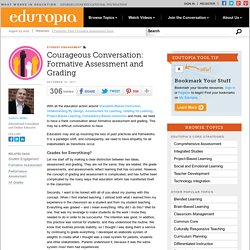
This may be a difficult conversation to have. Educators may end up mourning the loss of past practices and frameworks. It is a paradigm shift, and consequently, we need to have empathy for all stakeholders as transitions occur. Freedom to Fail. 10 questions to ask yourself before giving an assessment: 1).
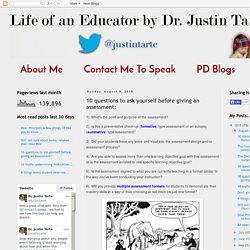
What's the point and purpose of the assessment? 2). Is this a preventative check-up (formative) type assessment or an autopsy (summative) type assessment? 3). Did your students have any voice and input into the assessment design and/or assessment process? 13 Resources for Making the Most of Assessment Data. K-12 educators are familiar with the “three-legged stool” of education.
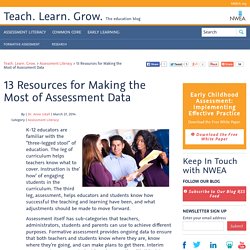
The leg of curriculum helps teachers know what to cover. Instruction is the’ how’ of engaging students in the curriculum. The third leg, assessment, helps educators and students know how successful the teaching and learning have been, and what adjustments should be made to move forward. Assessment itself has sub-categories that teachers, administrators, students and parents can use to achieve different purposes. 3 Peaks and 3 Pits of Standards-Based Grading. Change involves the celebration of successes and the reflection on shortfalls.
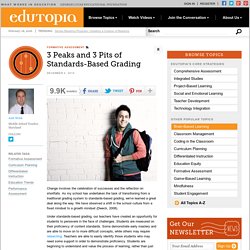
As my school has undertaken the task of transitioning from a traditional grading system to standards-based grading, we've learned a great deal along the way. We have observed a shift in the school culture from a fixed mindset to a growth mindset (Dweck, 2008). Under standards-based grading, our teachers have created an opportunity for students to persevere in the face of challenges. Educational Leadership:Expecting Excellence:Seven Reasons for Standards-Based Grading. Grades That Show What Students Know. No-Zero Grading Policy In Lowndes County Schools Require Retesting Opportunities For Failing Students (UPDATED) Lowndes County Schools students in Georgia can relax a little -- 3rd through 8th graders can no longer receive zeros on assignments.

Under a new policy, report cards and progress reports will reflect a 60 out of 100 as the lowest grade, and teachers must offer students opportunities to retake tests and redo assignments until a passing grade is earned. The highest grade earned will be recorded, and teachers cannot record zeros, but can give an "incomplete" for work not turned in after insisting that the assignment be completed. UPDATE 2/5/2012 11:00 A.M.: Lowndes County Schools Superintendent E. Steven Smith issued a statement Saturday. Compare formative and summative assessments.
Standards Based Grading. The Flipped Classroom vs the Flipped Mastery Classroom. School Failure. Assessment, Intervention, and Prevention in Primary Pediatric Care Robert S.
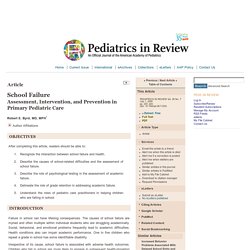
Byrd, MD, MPH* Wormelli-r-2011-redos-and-retakes-done-right. Why Formative Assessments Matter. Summative assessments, or high stakes tests and projects, are what the eagle eye of our profession is fixated on right now, so teachers often find themselves in the tough position of racing, racing, racing through curriculum.
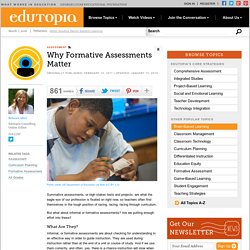
But what about informal or formative assessments? Are we putting enough effort into these? What Are They? Informal, or formative assessments are about checking for understanding in an effective way in order to guide instruction. Standards%20Based.pdf. Marzanos%209%20strategies.pdf. Why We Must Get It Wrong To Get It Right & 4 Other Facts About Learning. Posted by Holly Fawcett Why is it that you can sit in a training session for half a day, really enjoy it and think it’s the best learning opportunity you’ve had all year, and then a week later you’ve forgotten almost all of what you had learned.

You’re back to old habits (because it’s easier), and your memory just ain’t what it used to be when you were learning new things in school. ASCD Express 10.23 - Ten Things Master Teachers Do. Ten Things Master Teachers Do Annette Breaux Master teachers—those who have figured out how to get students to do and be their best, how to simplify the complex, how to look forward to their jobs each day, and how to create lasting memories in the hearts and minds of students—once struggled as new teachers, too.
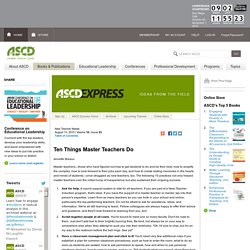
Standards Based Grading in a percentage based world. I’m participating in the math blogging initiative and thankfully the list of writing prompts is not intimidating.

I could write about how I chose the name for my blog—I am extremely curious and I want my students to be too. But I really want to talk about something else. Something that has piqued my curiosity. Standards based grading. Standards_based_grading.pdf. In 'Flipped' Classrooms, a Method for Mastery. Fixes looks at solutions to social problems and why they work. In traditional schooling, time is a constant and understanding is a variable. A fifth-grade class will spend a set number of days on prime factorization and then move on to study greatest common factors — whether or not every student is ready. If student turns in shoddy work in a ‘flipped mastery’ class, she can’t move on to the next level. But there is another way to look at schooling — through the lens of a method called “mastery learning,” in which the student’s understanding of a subject is a constant and time is a variable; when each fifth grader masters prime factorization, for instance, he moves on to greatest common factors, each at his own pace.